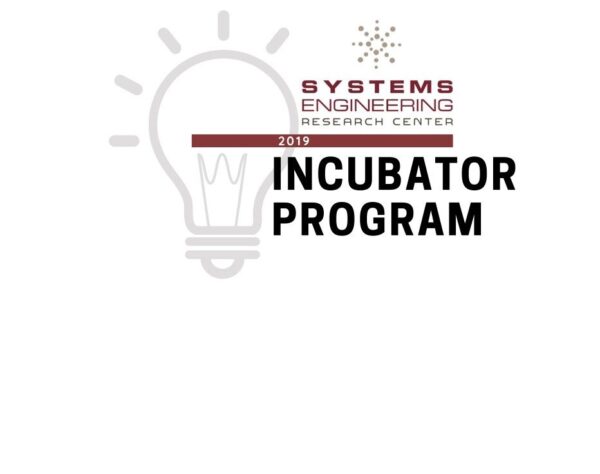Call for New Research Proposals

This is a call open to all faculty and research staff at SERC Universities for research proposals. These research proposals will be assessed for funding from the SERC Core funds and other sponsor funding sources as incubator research projects. The need for new project incubation is an integral part of the SERC 2019-2023 Technical Plan. While we believe that the current research programs have great potential to transform engineering in the DoD and Intelligence Community, there is once again a need to support new ideas in their infancy that address emerging DoD challenges and opportunities. We plan to use this call as the primary means of allocating the accumulated funds created by decrementing the current major Core-funded projects by 20% per year after their first two years. Subject to available funding, a number of high-quality proposals will receive initial seed funding not to exceed $25k per award. Preference will be given to proposals that are in areas or use novel approaches not currently addressed by the existing SERC research portfolio.
Additionally, in the second phase of the incubator program, a small number of research proposals from within the projects initially awarded seed funding that are determined to be significant and relevant may be selected as regular research projects with a significantly higher level of funding ($200k or higher).
The deadline for the submission of papers is May 1, 2019.
- Mission Engineering and Integration: Developing an architectural framework for the integration of a heterogeneous array of systems for the execution of a mission:
- Innovative approaches to modeling systems as missions and enterprises: systems as a service model, large-scale simulations with dynamic objectives, modeling incentive schemes that overcome mission enterprise fragmentation, simulating human machine co-adaptation, methods to enable the assessment of “weak links” in the mission thread
- Assessing mission impacts of emergent technologies: means to predict or dynamically evaluate emerging technologies for insertion into the mission thread, approaches to predict or dynamically reevaluate mission concept of operations driven by disruptive technologies
- Velocity: Developing and sustaining capabilities that support emergent and evolving mission objectives (deter and defeat emergent and evolving adversarial threats and exploit opportunities, affordably and with increased efficiency):
- Innovative uses of digital engineering: model curation and validation, integrating MBSE with large scale dynamic simulation, ontologies that address resilience and other qualities, analytical approaches sustainability in SE lifecycles
- SE methods for continuous development and deployment: system architectures that enable continuous development, decomposition of system to micro-scales, managing macro-scale systems, platforms & interoperability
- Security: Designing and sustaining the demonstrable ability to safeguard critical technologies and mission capabilities in the face of dynamic (cyber) adversaries:
- Integrating Dependability/Safety/Security engineering to provide potential economies for defenders via cost-effective means for achieving mission security, including applications of these approaches to new domains such as space
- Innovative approaches to automate assurance case design, coverage, and evidence collection and to monitor for and recognize potential design deviations and errors derived from engineering and program management activities
- AI & Autonomy: Developing and supporting system engineering methods, processes, and tools to understand, exploit and accelerate the use of AI and autonomy in critical capabilities:
- AI-enabled SE: big data analytics, machine learning, and novel human-computer approaches to aid SE data analysis, model building and evidence building
- SE-enabled AI: synthesis of human, physical, and AI/ML systems sciences to promote better design and trusted performance of next-generation DoD capabilities
- Lifecycle processes for AI systems: development approaches that adapt with the AI components and resilience architectures and solutions that sustain operation during adaptation; Test and evaluation for AI systems
- Human Capital Development: Creating the future Systems Engineering workforce:
- Accelerating the impact of digital engineering, model-based engineering, model-based assurance, artificial intelligence and machine learning, and continuous development approaches on systems engineering, including leadership, teamwork, collaboration and change management
- Education for the systems engineering of complex, evolving systems
To apply for the incubator funding, complete a short description of your proposed research concept addressing the first five Heilmeier Criteria, namely:
- What are you trying to do? Articulate your objectives using absolutely no jargon.
- How is it done today, and what are the limits of current practice?
- What’s new in your approach and why do you think it will be successful?
- Who cares?
- If you’re successful, what difference will it make?
Following this description provide a short summary of the work to be completed in the incubator phase of your proposed research. Proposals should be less than two pages in length. Also include the names of the research team, university, and research challenge area with the title of your proposed research task. The overall value of the submissions will be judged, as will the final whitepapers, on several criteria:
- Intellectual merit
- Clarity of the vision
- Past performance of the investigators
- Current funding
- Strategic impact on the SERC and DoD
Submissions should be sent to Tom McDermott, Deputy Director, SERC.
